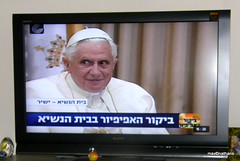 Addressing a crowd of 30,000 worshipers yesterday in Amman, Jordan, Pope Benedict XVI began an open-air mass with the words, “In the name of the father, the son and the holy spirit, as salamu aleikum.” In the first of four masses the Pope will hold in the Middle East this week, the audience of Arab Christians were told to hold fast to their religious roots and ancient heritage despite facing hardship. Part of purpose of this four-part trip is to heighten Christianity’s profile in the region: the number of Arab Christians in the Middle East is expected to fall from an estimated 12 to 14 million followers at present to only 6 million by 2025. His “pilgrimage” to the Holy Land ends on Friday.
Addressing a crowd of 30,000 worshipers yesterday in Amman, Jordan, Pope Benedict XVI began an open-air mass with the words, “In the name of the father, the son and the holy spirit, as salamu aleikum.” In the first of four masses the Pope will hold in the Middle East this week, the audience of Arab Christians were told to hold fast to their religious roots and ancient heritage despite facing hardship. Part of purpose of this four-part trip is to heighten Christianity’s profile in the region: the number of Arab Christians in the Middle East is expected to fall from an estimated 12 to 14 million followers at present to only 6 million by 2025. His “pilgrimage” to the Holy Land ends on Friday.
Russia and Japan signed an “intergovernmental nuclear cooperation deal“ today during Russian Prime Minister Vladimir Putin’s visit to Tokyo. The agreement, signed after talks between Putin and Japanese Prime Minister Taro Aso, allows for joint effort and cooperation in nuclear fuel-cycle services and nuclear power plant construction. The agreement will reportedly clear the way for Russia to supply low-enriched uranium to Japan at costs estimated in the “hundreds of millions of U.S. dollars.” Sergei Kiriyenko, part the delegation accompanying Putin during his visit, noted that the deal adhered to nonproliferation agreements. This was also an opportunity for the two countries to address, once again, the ongoing territorial dispute over the South Kuril Islands, which Putin said could be resolved by “building mutual trust and developing strong economic ties.”

In eastern Afghanistan, the Taliban launched a coordinated attack on government buildings that killed eight and resulted in a hostage situation. The standoff in Khost, a city about 20 miles from Pakistan, is another example of the escalating violence that has taken over much of the country in the last year. The Obama administration pulled America’s top general in Afghanistan yesterday, replacing Gen. David D. McKiernan—commander for less than a year—with Gen. Stanley McChrystal in an effort to refocus the military’s strategy against bolder Taliban tactics. McChyrstal, who has experience leading commando operations in Iraq, will face militants who have shown increasing adeptness in sieges on government buildings in Kabul and offensives against U.S. and NATO forces in rural poppy fields. The commander swap comes just as the Pentagon prepares to deploy about 20,000 more troops to Afghanistan.
After an unscheduled vacation, millions of Mexican elementary schoolers returned to classrooms today for the first time since the outbreak of the H1N1 virus, or swine flu. The government had canceled classes and stopped most public activities for more than 10 days to prevent the spread of the new flu strain that, to date, has killed 61 people worldwide—with most of the fatalities having occured in Mexico. The return to normalcy comes just as doctors from the United Kingdom released a report saying that the flu could infect up to one in three people worldwide in the next six to nine months. Researcher Neil Ferguson said that although the flu is not quickly spreading right now and the death rate is unknown, “we really need to be prepared, particularly for the autumn” when flu season hits.